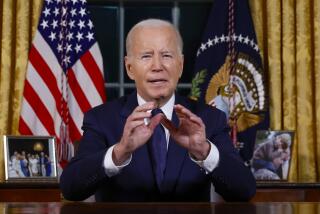U.S. Must Listen to Others
- Share via
The Bush administration’s outright rejection of the Kyoto treaty on global warming, the International Criminal Court and the Antiballistic Missile Treaty with Russia has earned it the label “unilateralist” and the image of the lone gunslinger. But even the superpower atop the globe sometimes needs allies, especially when it wants to fight an international war against terrorism. It is important to understand the concerns of nations whose help the United States seeks in tracking down terrorist cells, freezing their funds and bringing their members to justice.
Last week, the Pew Research Center for the People & the Press brought some mixed news. Its survey of more than 38,000 people in 44 nations found sympathy for the United States after the attacks on the Pentagon and World Trade Center but increasing discontent with U.S. policies and attitudes. In 80% of the nations, most people viewed the United States and its citizens favorably. However, in the Middle East and Central Asia, perceptions were on the negative side.
The research organization said opinions about the United States were “complicated and contradictory,” embracing some aspects of America but decrying its influence. Typical of this was an Egyptian businessman who said he envied U.S. residents their democracy but was tired of seeing U.S. movies and fast-food restaurants all over Cairo.
Differences over Iraq are stark, with a majority of those questioned outside the United States believing that Saddam Hussein is not a threat and that the main U.S. motive in threatening invasion is control of Iraqi oil.
A lone superpower, no matter how benign, generous and cooperative, cannot fail to attract envy and discontent. But that is not the whole story. Washington has to be more willing to engage other governments and their citizens. That does not necessarily lead to policy changes, but it does mean staying at the table through disagreements over global warming treaties and the International Criminal Court. It is better to keep the dialogue going, explain U.S. objections and try to solve problems
Secretary of State Colin L. Powell did just that in the Security Council debate on sending weapons inspectors back to Iraq, repeatedly telephoning his counterparts to outline the U.S. position and seek support. In contrast, the “my way or the highway” approach of some others in the administration angers allies as well as foes and may increase reluctance to provide troops in Afghanistan, freeze Al Qaeda bank accounts and share the results of interrogation of terrorism suspects. The U.S. must say explicitly that it needs and appreciates the help of others.
The United States has helped Muslims in Bosnia and Kosovo; it provides assistance to Palestinians and others worldwide. Telling that story while listening to other nations can increase understanding of the United States and reduce global discontent with its necessary leadership.
More to Read
Get the L.A. Times Politics newsletter
Deeply reported insights into legislation, politics and policy from Sacramento, Washington and beyond. In your inbox three times per week.
You may occasionally receive promotional content from the Los Angeles Times.










